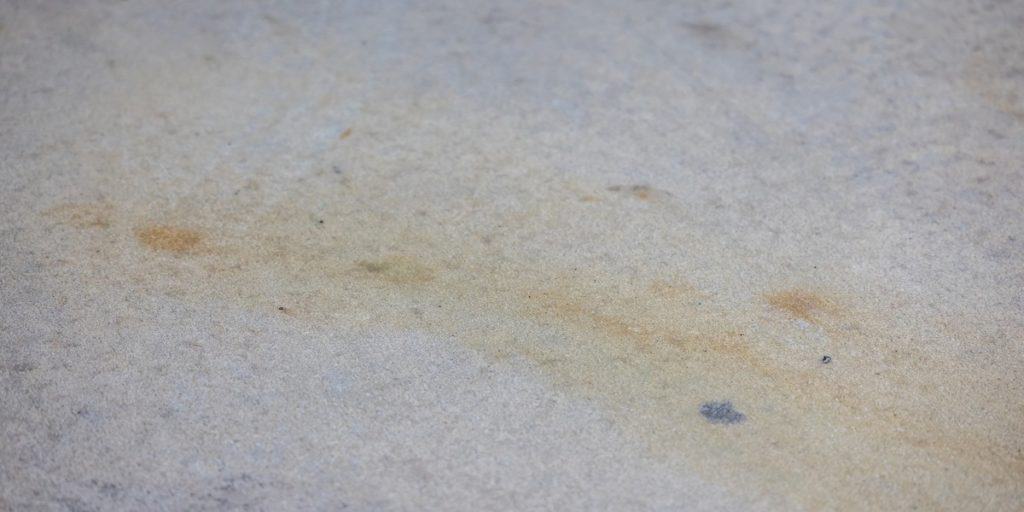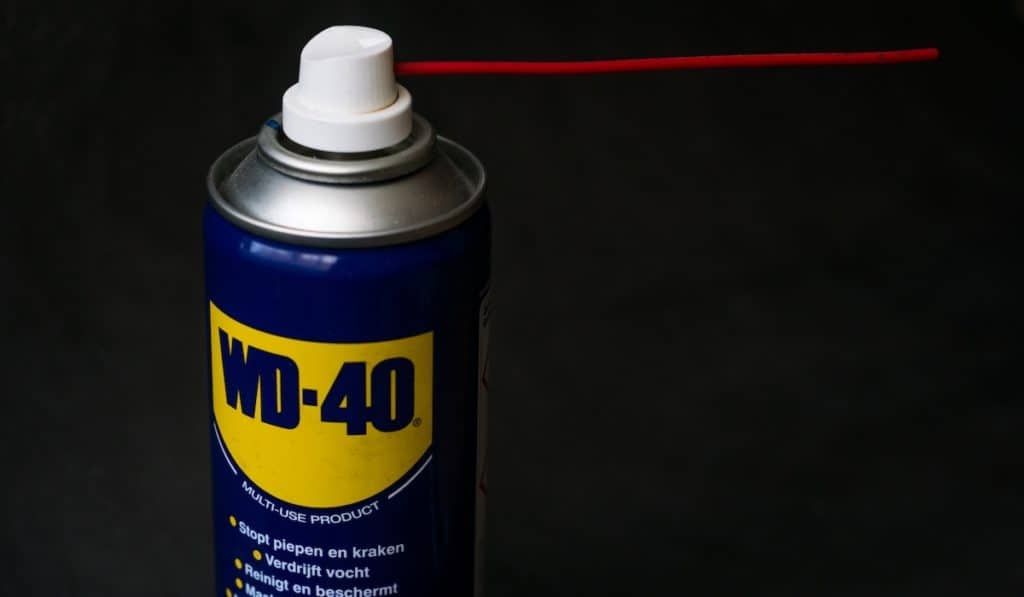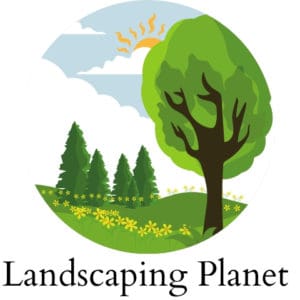You work hard to keep your property looking its very best. That’s why it can be such a headache when, after all that hard work, you look at your driveway, walkway, or other concrete and pavement on your property to see unattractive rust stains have formed. But what causes these stains, and what can be done to remove them?
Rust stains occur when the iron content in fertilizer reacts with water. There are various fixes for this issue, including using a cleaning solution with white vinegar, solutions with stronger acids, or applying specialized rust removers. You can also take steps to prevent rust from forming.
Understanding this common lawn nuisance and what causes it is the first step to getting your lawn back to its natural, attractive appearance. In this article, I’ll explain in more detail what causes these unsightly blemishes to form. I’ll also take a look at some common solutions used to remove stubborn rust stains from the concrete or pavement on your property.
On What Materials Will Rust Stains Form?
Rust stains can form on a variety of different materials, making this a problem that plagues all kinds of homeowners regardless of the specific materials found on their property. One common place for rust stains to form is on the driveway. This is because this substance can easily form where asphalt or pavement makes contact with your lawn and the fertilizer that goes into it.
Concrete is another substance that rust stains might show up on. The sidewalks along the edge of your lawn or the walkways that run throughout the property are susceptible to fertilizer rust stains. There are other places where you might see rust stains form, but these two types of surface are the most common culprits.
Wherever rust stains form on your property, you must get rid of them. Removing the rust stains is crucial to achieving the attractive look you desire for your lawn.
The first step in getting rid of this common problem is understanding what causes it in the first place. Let’s take a look at the process that leads to the formation of rust stains before we explore some of the techniques used to remove this unsightly blemish from your yard.
What Causes Fertilizer Rust Stains?
Fertilizer rust stains are caused by the iron content of the fertilizer you use reacting with water it comes into contact with on your lawn. This chemical reaction leaves behind a byproduct that shows up as the brownish-red rust stains that homeowners are all too familiar with. The rust stains usually occur on the pavement, concrete, and other surfaces around the property.
The thing is, most fertilizers contain some iron content in their formulation. When you water your lawn or rain, dew, or other moisture comes into contact with this fertilizer, it kicks off a chemical reaction that leads to the formation of rust stains. Understanding this chemical reaction, which we’ll take a look at below, will help you better understand rust stains and how to get rid of them.

Understanding the Oxidation Process
Getting a better understanding of what causes the rust stains that form in your yard will help you better determine how to prevent or remove them. At its essence, the cause behind these blemishes on your property comes down to a chemical reaction known as oxidation.
Oxidation is a term that refers to the chemical reaction that causes atoms, molecules, or ions to lose one or more electrons. When it comes to rust, this process creates a contaminant byproduct that creates the familiar reddish-brown substance that can be seen on old metal or, as discussed here, on concrete in contact with your yard.
You can check out this research from ACS Publications to get a better understanding of the oxidation process and how it occurs. For our purposes, I’m more concerned with how to remove the results of this chemical process, which shows up as those unsightly brownish-red splotches on your pavement in places where it meets your yard.
Let’s take a look at one of the most popular ways to remove rust stains.
Will WD-40 Remove Rust Stains?
Unbeknownst to you, you may already have a secret weapon in the fight against rust stains around your house. The versatile household product known as WD-40 is an effective solution for removing rust stains. Because WD-40 is formulated to be a penetrant, it has the ability to get under the rust, thus removing it from the surface it has settled on.

Using WD-40 on rust stains is a fairly straightforward process. Simply do the following:
- Spray the WD-40 to cover all the rust stains in the affected area.
- Let the solution sit for about ten minutes, during which time it will get to work and begin breaking down and loosening the rust stains.
- Once the solution has settled for some time, scrub away both the solution and the rust stains with a lightly-abrasive tool such as aluminum foil or a toothbrush.
This WD-40 Multi-Use Lubricant Penetrant Spray, available on Amazon, will help you take care of even the toughest rust stains. This particular can also comes equipped with a smart straw that allows for more precision when applying the substance. It lets you get to rust stains even when they form in hard-to-reach areas.
Other Ways to Remove Rust Stains
Anyone who has dealt with rust stains on their property can attest to the fact that these ugly splotches can be very persistent. Rust stains aren’t water soluble, so scrubbing them with water isn’t enough to remove them. You’ll need something stronger to eliminate these marks and get your property back to looking its very best.
Have unsightly rust stains you want to get rid of? I’ve got a few effective solutions. We’ll also look into how you can stop these rust spots from forming in the first place to save you the effort of having to remove them.
Dish Soap
In many cases, simply applying some of the dish soap that you use in your kitchen every day will be enough to remove the unappealing rust stains from your pavement. The same grease-fighting power that this type of product uses to keep the dishes in your kitchen clean can also be used to tackle this common landscaping issue.
Here’s how to go about it:
- Mix some dish soap into a bucket of water and apply the mixture to the affected area. The key step is to let the soap sit for some time after applying, as this will let the product set in and begin to break down the rust stains.
- Let the mixture sit for around five or ten minutes.
- Scrub away the mixture and clean the rust stains. Be sure to scrub vigorously; rust stains can be quite stubborn hence you need a bit of elbow grease to remove them.
- Repeat the process several times if needed to completely remove the stain and give your lawn the look you desire.
White Vinegar Solution
Dish soap isn’t the only common household product that can be used in your fight against rust stains. The same white vinegar you use for cooking or household cleaning projects can also be utilized in your lawn to fight against the formation of rust stains.
You can use vinegar in more or less the same way that you would use soap and water.
- To get started, make a cleaning solution of about half white vinegar, half water.
- Use a roller, rag, or other method to apply this solution to the area with rust stains.
- Leave the mixture to set on the affected area for several minutes, then scrub forcefully to try to remove the stains.
Stronger Acid Cleaner
If dish soap and white vinegar aren’t quite doing the trick, there are other DIY methods that you can try out to get your lawn back to looking its best. The reason behind vinegar’s effectiveness in removing rust stains is its high acidity. Thus, you can use the acidity in other common household products to make other DIY cleaners that may help with your lawn’s rust stain issue.
You can try using strong natural acids, such as lemon juice, diluted in water to remove rust stains. Use this solution in much the same way you would use water and vinegar:
- Make a mixture composed of about half the acid solution and the other half water.
- Apply the solution to the affected area.
- Let it sit for five to ten minutes, then scrub vigorously to try to remove the rust stains.
- Repeat this process a few times in order to get the best possible results.
If none of the above methods have given you any positive results so far, you might try using a stronger acid solution to tackle the rust stains.
Muriatic acid is one possible solution to your rust stain issues. Because this acid is much more powerful than others you would typically find around the house, dilute the acid in a mixture of about 40 parts water to one part muriatic acid.
Be sure to use caution if you use a particularly potent acid in your rust stain removal process. Strong acids give off fumes that can be damaging if inhaled and can also cause irritation if they make contact with your skin. Wear proper safety equipment, such as gloves and a mask, and handle these materials with great care if you intend to use them in your home improvement projects.
Specialized Rust Removers
Most rust stains can be removed with these cleaning products already present in your home. However, some especially stubborn rust stains may withstand treatment using these easy-to-find solutions. That’s where specialized rust stain removing products come into play, providing extra strength in your fight for a clean, healthy-looking lawn.
This Singerman Laboratories Rust Remover for Concrete, available on Amazon, will provide you with the results you’re looking for even when you’re faced with the toughest rust stains possible.
The rust remover comes in powder form. You mix it with water to form a gel that’s effective in removing rust from concrete and natural stone surfaces, leaving them looking as good as new. The great thing about this rust remover is that it’s environmentally friendly so it won’t harm your grass or other vegetation.
To use Singerman Laboratories Rust Remover:
- Spread the product on the sustained surface and leave it for up to 15 minutes, depending on how severe the rust stains are. You do not need to do any scrubbing.
- Once the stains have disappeared, rinse the surface thoroughly. This will prevent the stain from re-depositing on your now rust-free surface.
Prevent Rust Stains from Forming
Knowing the different methods for removing rust stains is essential for anyone looking to keep their lawn looking its best. But what if you could stop these stains from forming in the first place? They say that an ounce of prevention is worth a pound of cure, and this old saying holds true when it comes to this aspect of lawn care.
Iron is an essential nutrient that plants need for healthy growth. However, if excessive amounts of this nutrient are present in your lawn, you’re creating the perfect conditions for pesky rust stains to form. Using a fertilizer that has a low iron content is one way you can prevent rust stains before they even show up.
Using a fertilizer that only provides the amount of iron that plants need will help you cut down on rust stains forming. It will also reduce your struggles to find ways to deal with the problem after the fact. This Green Feeder Automatic Injection System (link to Amazon.com) will provide your lawn with the nutrients it needs while also preventing the formation of rust stains. When used as directed, the product is guaranteed to leave behind no rust stains.
Final Thoughts
Now you have a number of different solutions to help you remove any rust stains that have formed on your property. By better understanding the causes behind these stains, you can also adjust the strategies you use in caring for your lawn and prevent the rust stains from forming in the first place. Ultimately, applying this knowledge will help you maintain your lawn at its best.
Sources:
- Lawn Buddies – How to Remove Fertilizer Rust Stains from Your Sidewalk or Driveway
- The Rust Store – How Do I Remove Rust Stains Caused By Fertilizer?
- CWST – Types of Rusting
- ACS Publications – A New Approach to Understanding Oxidation-Reduction of Compounds in Organic Chemistry

